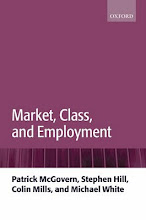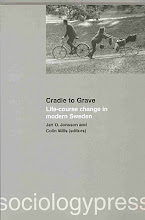This is a place marker because with exam marking and other stuff to do I can't write at length just now. You'll have to believe me that I really did intend to write no more here about the Great British Class Survey. I'll have to remind myself that in future I shouldn't make rash promises. The thing is that the target keeps getting bigger and bigger as the guys and gals over at GBCS feel compelled to say more and more daft things as they attempt to rewrite history.
One could just shrug one's shoulders and say "whatever" but to do so would amount to giving up on British quantitative empirical sociology. I should say that sometimes I feel like doing just that, but then I tell myself I would have no right to expect things to get better. In any case I simply don't think people should be allowed to get away with claiming things that aren't true or, even if unintentionally, highly misleading. Those involved with the GBCS are not small fry. Some of them are extremely influential in British sociology. They do know better or if they don't they should.
So what provoked these thoughts? It was the latest Sociological Review Blog post by Daniel Laurison: Three Myths and Facts About the Great British Class Survey in which he employs casuistical skills worthy of the Jesuits to argue that that the GBCS has been misunderstood by its critics and that in consequence various myths about it have passed into common currency.
My take on this is that two of the three are not myths at all and that the substance of these is essentially correct. To convince you I would have to make a much more careful argument than I have time to write down at the moment. But I can give you a flavour of where I'll go when I have more leisure.
Myth 2 as stated by Laurison is that the GBCS team "proposed their seven new classes to take the place of
all heretofore existing measures in class analysis, especially the
NS-SEC."
You can immediately see the sophistry coming out in this. Taking it literally I can indeed find no statement in what the GBCS team have written to the effect that their class scheme should "take the place of
all heretofore existing measures in class analysis". But this is just a rhetorical dodge.
The first GBCS article starts off with a page and a half of criticisms (pp. 221-223) purporting to show that the NS-SECs are deficient in all sorts of ways. Never mind that almost everything that is said is either half-baked or in some cases just factually wrong the GBCS people persuade themselves that the NS-SECs are just not up to the job (though they never really say what the job is). This seems to be an important reason for developing their own approach to measuring social class.
The first GBCS article starts off with a page and a half of criticisms (pp. 221-223) purporting to show that the NS-SECs are deficient in all sorts of ways. Never mind that almost everything that is said is either half-baked or in some cases just factually wrong the GBCS people persuade themselves that the NS-SECs are just not up to the job (though they never really say what the job is). This seems to be an important reason for developing their own approach to measuring social class.
The obvious thing to ask is: why would you bother to develop something new if you didn't think it was better than what already exists? What is the point of difference for its own sake? You wouldn't purposely try to invent something that was worse than whatever exists and surely if you thought it was better you would want people to use it in preference to what went before. To now say that there was no intention or attempt to discredit the NS-SEC scheme or indeed all occupation based ways of measuring class is to invite utter incredulity.
How for instance is this compatible with Professor Savage making public utterances to the effect that occupational based schemes are becoming less useful because over time they explain less between occupation variance in earnings (or income)? As I've pointed out before this is just factually incorrect and Professor Savage, to judge by the citations he makes, has read the research that shows this to be the case, so he can scarcely say that he was unacquainted with the facts. Did he misspeak? Or is he just of the opinion that the facts don't matter (when they are inconvenient). I think he owes it to us to come out from the shadows and enlighten us.
And then there is Myth 3. This according to Laurison is: "Because the GBCS is not a random-sample or representative survey, it cannot be used to say anything worthwhile about class (or anything else) in the UK". Again the same tactic, create a straw man kind of statement that is so extreme it is easy to discredit.
Do I think any useful empirical knowledge has come out of the GBCS? I sincerely believe that none has. Might some be produced in the future? It is certainly possible and I've even suggested in print what I think a sensible way would be to make the best of a decidedly bad job. Are the GBCS team likely to produce that knowledge? Well on their showing so far it looks unlikely. In fact they seem to be in a state of denial. I can't interpret this statement from Laurison in any other way: "Multiple regression and related methods can essentially help ‘control’ for the skews. While the mean value of any variable in the GBCS is almost certainly different from that for the population as a whole, the relationships between variables will often be similar."
Only Daniel under very special circumstances which are unlikely to hold in the case of the GBCS. Jim Heckman got a Nobel Prize for showing why sample selection bias is a matter of both the slopes and the constant and what, in some circumstances, you can do about it.
And then there is Myth 3. This according to Laurison is: "Because the GBCS is not a random-sample or representative survey, it cannot be used to say anything worthwhile about class (or anything else) in the UK". Again the same tactic, create a straw man kind of statement that is so extreme it is easy to discredit.
Do I think any useful empirical knowledge has come out of the GBCS? I sincerely believe that none has. Might some be produced in the future? It is certainly possible and I've even suggested in print what I think a sensible way would be to make the best of a decidedly bad job. Are the GBCS team likely to produce that knowledge? Well on their showing so far it looks unlikely. In fact they seem to be in a state of denial. I can't interpret this statement from Laurison in any other way: "Multiple regression and related methods can essentially help ‘control’ for the skews. While the mean value of any variable in the GBCS is almost certainly different from that for the population as a whole, the relationships between variables will often be similar."
Only Daniel under very special circumstances which are unlikely to hold in the case of the GBCS. Jim Heckman got a Nobel Prize for showing why sample selection bias is a matter of both the slopes and the constant and what, in some circumstances, you can do about it.
It's actually very easy to run a simulation to show how severe the impact can be. This morning it took me about 30 seconds to grab some STATA code from the web to sample from a population with a known correlation structure, adapt it to mirror the structure of the GBCS data collection strategy and calculate what happens when what you observe involves selection on unobsevables. Thirty years ago, if not quite rocket science, it was at the cutting edge of social science and now I teach it routinely to my MSc students in the compulsory Research Design course. I can assure you that " the relationships between variables" was most definitely not similar. What my MSc students get apparently LSE sociology faculty don't. Perhaps with all the riches gleaned from the REF they should engage in some in service training.
And finally, what are we to make of the puff put out by Penguin about the forthcoming GBCS book? After losing six of the classes for the SR special issue, the seven classes are back again: "The book presents the ideas and facts
behind their new conceptualization of class: a new British class system
composed of seven classes" What about the inconvenient 8th that they admit to in the documentation deposited at the UK Data Archive? Did it get forgotten at the back of the cupboard? Or like an unwanted child has it been put up for adoption?










1 comment:
Hi Colin.
Thanks for your comments on the GBCS. I've also read some of the articles published in British journals, including your articles. I'm looking forward to your book review of the GBCS book to be published by the end of 2015. ;)
Are you aware of the Bourdieu inspired class scheme developed by a group of Norwegian sociologists?
Here is an English summary of their class scheme, which they use to analyse Norwegian register data (and I assume they can apply their class scheme to surveys also):
https://www.sv.uio.no/iss/forskning/publikasjoner/memoranda/pdfs/memorandum_01_09.pdf
I am currently reading their book on elites and class (where the focus is on the higher strata in their class scheme), published this year. As I know you know Swedish, here is a link to the book and its list of contents:
http://www.universitetsforlaget.no/nettbutikk/elite-og-klasse-i-et-egalitaert-samfunn-uf.html
http://magento.aschehoug.no/media/blfa_files/9788215021836.pdf
The aims for the GBCS and the ORDC class schemes seems to be the same: A new class scheme that is inspired by Bourdieu's class theory concepts and his usage of correspondence analysis, and which more or less ignores the schemes by e.g EGP/ESeC or E.O.Wright. Unlike the GBCS the ORDC does not "discover" the number of classes etc. Instead, they have a conceptual scheme, a model, that they fit their data to, but the size of each class is an empirical question.
While the GBCS gets it all wrong due to using a self-selection web survey (plus a small national representative sample that is somehow linked to the web based survey), which is doomed to be biased for many reasons, the ORDC uses register data which is less biased. (In my opinion it has some bias that seems to be ignored by its users, such as high item-missing of education register data and the occupational codes being unreliable as it is employers (read: their secretaries) with no (scientific) motivation to code the data correctly that assign an occupational code to all those employed at their company).
Nevertheless, even if I am no supporter of their work, to me it looks like the ORDC gets it more right than the GBCS does, and comparing the work of the two research groups could be fruitful for anyone who wants to beat the GBCS on their home turf. I also think some of those working within the Bourdieu tradition in Scandinavia, but who are well skilled in quantitative analysis (both correspondence analysis and other techniques), such as Johs. Hjellbrekke and Korsnes, could have a lot to say about the GBCS if they were asked to give their opinion.
bw,
Erling
Post a Comment